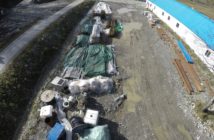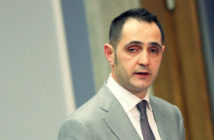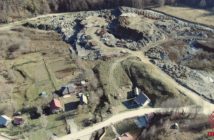Podgorica, 28 December 2010 – The outgoing Minister of Urban Planning Branimir Gvozdenović had more than an incidental role to play in the Zavala affair. For this reason it is unacceptable that he prosecution has excluded him from consideration, treating him only as a witness in the proceedings.
From the onset of construction at Zavala in 2008, Minister Gvozdenović was provided with all the necessary information about what was actually happening with the Astra Montenegro development. His duty was to ensure full compliance with urban planning laws and regulations in the country, including their implementation in the Municipality of Budva.
Gvozdenović failed to undertake a number of administrative measures that could have halted illegal construction at Zavala. If this had been done the subsequent damage to the budget would have been much lower. Banning construction, sealing the location and demolishing illegally erected buildings were not considered as options by Gvozdenović in 2008. The only penalty that the company “Zavala Invest” had to pay for the illegal building of a 200-million euro development was a mandatory 220 euro fine handed down by the Municipal Police of Budva.
Even after the Zavala affair was revealed to the public by MANS, including the fact that a Russo-Montenegrin company partially owned by Svetozar Marović was behind the project, Gvozdenović continued to claim that the government did not know who was building at Zavala (other than the fact that it was an important investor).
Similarly, while construction continued at Zavala, the Ministry of Urban Planning presided over a “Coordinating Body for Suppressing Illegal Construction on the Coast” headed by Rajko Kuljača. The Zavala affair never made the agenda of this body.
Instead of imposing sanctions for illegal construction, in late 2008 Minister Gvozdenović gave his approval for the necessary planning documents and personally signed the construction permits that effectively legalized the months of illegal construction at Zavala.
The planning documents and building permits secured by Gvozdenović for the project verge on forgeries because the area of the Zavala peninsula affected by construction was treated as an empty space where work was yet to begin. Gvozdenović effectively signed documents at a time when he was aware that the situation on the ground was radically different from what was stated in the planning documents. Gvozdenović did not hesitate to issue these documents even though he knew that the whole matter was being verified by the Chief State Prosecutor due to suspicions of corruption and accusations of criminal association of companies and individuals in the project.
Gvozdenović had no problem with the fact that at that moment the development at Zavala was the largest illegally erected building site in Montenegro. By issuing the permits Gvozdenović had a critical impact on the case, making it possible for “Zavala Invest” to avoid paying fines and escape criminal liability, thus allowing the company to realize huge profits from the sale of apartments from this illegal project.
Additionally, even after issuing the building permits, when Zavala Invest continued with the development and once it became clear that they were building more than the 32 apartments approved, Gvozdenović again failed to take action. MANS in June of this year informed Gvozdenović that the investor had significantly gone beyond what was approved in the building permits and that sales of these units were being made on the housing market. The Ministry simply responded that “the investor is building in accordance with the permits,” even though there is unassailable proof on the ground that this is not the case.
From the foregoing, there is reasonable suspicion that for several months Gvozdenović acted as a “service” for the illegal builders at Zavala and that his failures in oversight as well as his deliberate actions allowed third parties to avoid criminal liability (allowing them to illegally make
millions in profits).
The Montenegrin Prosector’s Office has been familiar with all these facts for years and it would be irresponsible to claim that Rajko Kuljača and Dragan Marović are the central actors in the Zavala affair. Gvozdenović’s responsibility was well known to the Prosector and it wasn’t necessary to spend years proving all this as they are now claiming from Ranka Čarapić’s cabinet in relation to the Kuljača and Marović cases.
Along these lines, MANS calls on the Chief State Prosector – for the umpteenth time in the past three years – to fully prosecute all those responsible for the Zavala affair. Otherwise, the partial prosecution of this case will be further proof of the politicization of the Prosecutor’s office and feigned political will in confronting corruption and organized crime.
Dejan Milovac
Deputy Executive Director
Urban Development Programme Director



